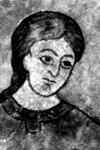Vratislaus I, Duke of Bohemia facts for kids
Quick facts for kids Vratislaus I |
|
|---|---|
 |
|
| Duke of Bohemia | |
| Reign | 915 – 13 February 921 |
| Predecessor | Spytihněv I |
| Successor | Wenceslaus I |
| Born | c. 888 |
| Died | 13 February 921 (aged c. 33) |
| Burial | St. George's Basilica, Prague |
| Spouse | Drahomíra |
| Issue | Wenceslaus I, Duke of Bohemia Boleslaus I, Duke of Bohemia Střezislava (?) |
| Dynasty | Přemyslid |
| Father | Bořivoj I, Duke of Bohemia |
| Mother | Ludmila of Bohemia |
Vratislaus I, also known as Wratislaus, was an important ruler from the Přemyslid family. He was the Duke of Bohemia from 915 until he passed away in 921. He was born around the year 888 and died on February 13, 921.
Early Life and Family
Vratislaus was the son of Duke Bořivoj I and his wife Ludmila. He was the younger brother of Duke Spytihněv I. Around 906, Vratislaus married Drahomíra, a princess from the Hevelli people. This marriage helped create strong connections with the Polabian Slavs, who lived in what is now eastern Germany.
Vratislaus had at least two sons:
- Wenceslaus
- Boleslaus
Both of his sons later became dukes of Bohemia, just like their father. Some historians also believe that a woman named Střezislava, who married a nobleman named Slavník, was Vratislaus's daughter.
Becoming Duke of Bohemia
When his older brother Spytihněv died in 915, Vratislaus became the new Duke of Bohemia. At this time, the lands around Prague Castle were changing. They were moving away from the influence of Great Moravia, a powerful Slavic state. Instead, they were becoming more connected to East Francia, which was a part of the Frankish Empire. This was especially true during the rule of Duke Arnulf of Bavaria.
Challenges and Alliances
Historical records show that Bavarian forces, working with the Bohemians, had already attacked Prince Mojmír II of Moravia of Moravia in the year 900. This shows how Bohemia was starting to form its own alliances.
Duke Vratislaus also dealt with the Hungarian invaders. He allowed them to pass through his lands. He even supported their military campaign against the Saxon duke Henry the Fowler in 915.
Legacy and Death
Vratislaus is remembered for several important achievements. He is credited with building St. George's Basilica at Prague Castle. This is a very old and important church. He is also believed to have founded the city of Wrocław in Silesia. The Latin name for Wrocław, "Vratislavia," comes from his name.
Vratislaus died in battle fighting against the Hungarians. While some think he died in 919, it is more commonly believed that he died in 921.
 | Frances Mary Albrier |
 | Whitney Young |
 | Muhammad Ali |

